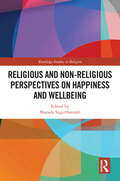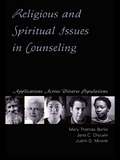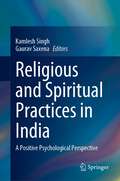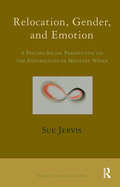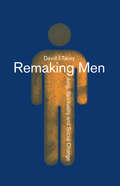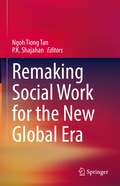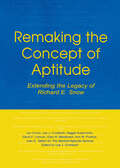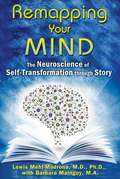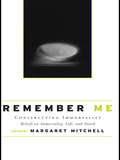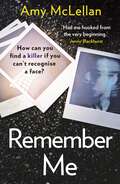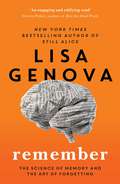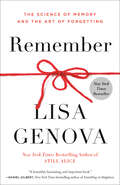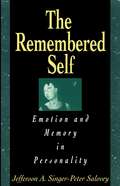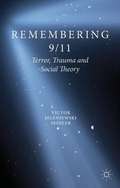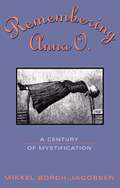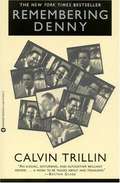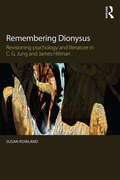- Table View
- List View
Religious and Non-Religious Perspectives on Happiness and Wellbeing (Routledge Studies in Religion)
by Sharada SugirtharajahThis book explores the theme of happiness and well-being from religious, spiritual, philosophical, psychological, humanistic, and health perspectives. Taking a non-binary approach, it considers how happiness in particular has been understood and appropriated in religious and non-religious strands of thought. The chapters offer incisive insight from a variety of perspectives, including humanism, atheism and major religions such as Christianity, Islam, Buddhism, Hinduism, and Judaism. Together they demonstrate that although worldviews might vary substantially, there are concurrences across religious and non-religious perspectives on happiness that provide a common ground for further cross-cultural and interreligious exploration. What the book makes clear is that happiness is not a static or monolithic category. It is an ongoing process of being and becoming, striving and seeking, living ethically and meaningfully, as well as arriving at a tranquil state of being. This multifaceted volume makes a fresh contribution to the contemporary study of happiness and is valuable reading for scholars and students from religious studies and theology, including those interested in interreligious dialogue and the psychology of religion, as well as positive psychology.
Religious and Spiritual Issues in Counseling: Applications Across Diverse Populations
by Mary Thomas Burke Jane Carvile Chauvin Judith G. MirantiReligious and Spiritual Issues in Counseling is a comprehensive resource for counselors, psychotherapists and psychologists seeking to understand and incorporate the spiritual dimension of a client's person, and to use this understanding in developing successful intervention strategies with clients. Including case studies and exercises for self-exploration, this book covers specific groups, such as the elderly, the homeless as well as multicultural populations. Human development concerns are integrated into the book and address the changing role that spirituality plays throughout the lifespan.
Religious and Spiritual Practices in India: A Positive Psychological Perspective
by Kamlesh Singh Gaurav SaxenaThis book explores the positive psychological aspects of religion and spirituality in the Indian context. It discusses the concepts and practices of Hinduism, Islam, Buddhism, Christianity, Jainism, and Sikhism and their impact on overall well-being. As the global enthusiasm for Indian spirituality grows, this book brings together scholars to share their perspectives and reflections on various religious aspects. The chapters offer readers a psychological "capsule" of mental health, well-being, compassion, kindness, character strength, mind-body relationship, and mindfulness, providing practical strategies for a better quality of life.Furthermore, this book offers insights into the different perspectives of happiness and well-being measured across diverse demographics. It also provides a qualitative conceptualization of happiness among older people, reflections on positive aging, and highlights the facilitators and inhibitors of happiness. With its comprehensive coverage and multidisciplinary approach, this book serves as a valuable reference for postgraduate and doctoral students of Psychology, as well as a treasure trove in the libraries for researchers and faculties associated with spiritual psychology, positive psychology, religious studies, comparative literature, mental health professionals, academicians, and anyone interested in allied health fields.
Reliving Past Lives: The Evidence Under Hypnosis
by Helen WambachTells of how to recall and learn from your past lives using techniques such as hypnosis.
Relocation, Gender and Emotion: A Psycho-Social Perspective on the Experiences of Military Wives (The\exploring Psycho-social Studies Ser.)
by Sue JervisThis book has two main aims: firstly, to provide a rare, detailed description of the use of a psychoanalytically informed, reflexive research method to achieve an in-depth understanding of social phenomena; and secondly, to throw some much needed light onto the complex, intrapsychic and interpersonal influences that impact upon "military wives" who accompany members of the British Armed Forces to postings overseas. These arguments are particularly relevant at a time when the military is over-stretched, given that unhappy wives can adversely affect the retention of servicemen. This is an important contribution to the on-going development of psycho-social studies.
Remaking Men: Jung, Spirituality and Social Change
by David TaceyThe nature of masculinity is a popular subject for contemporary authors, either treated critically from a sociological standpoint, or analysed from a psychological and spiritual perspective.In Remaking Men, David Tacey argues that we must strive to bridge the gap between these separate traditions - masculinity should neither be hijacked by the spiritual, Jung-influenced men's movement, nor discussed merely as a product of socio-political forces.Examining his own and other men's experience in a critical and lively discourse he evades the simplistic optimism of the 'inner journey' approach and the chronic pessimism of contemporary academic arguments. This is a fascinating and very accessible look at masculinity for those who want to explore self and society with intelligence and soul.
Remaking Social Work for the New Global Era
by Ngoh Tiong Tan P. K. ShajahanFuture social work practice requires a holistic framework to deal effectively with the great social and economic disruptions of this unprecedented time. Innovation and creativity are indispensable to empowering social workers and social service organizations to make an impact on the lives of people and societies in today's world. This book provides a range of innovative practices of social work drawing from alternate theories and with a global orientation. It is forward-looking with a focus on social resilience, social inclusion and recovery. Using a strengths perspective, discussions in the chapters provide useful insights in restructuring social life and social services at the individual as well as community and societal levels for meeting the challenges of a new global era.The chapters draw on the experiences of the authors in their academic and practice engagements and focus on a variety of arenas of social work education and practice to enrich the understanding of the present and future of the field. Authors discuss theoretical and conceptual models to review social work education and practice of engaging in a fast-changing global era and complex contexts. Topics explored include:New Era for Social Work in the Global FutureRemaking Social Work by Applying an Anti-oppressive LensVulnerability and Resilience of Refugee Women and ChildrenCritical Green Social Work as Futuristic Social Work PracticeGlobalisation and the Future of Social Work Practice and EducationEquipping Social Workers for a New Global EraRemaking Social Work for the New Global Era is an essential resource to inform practice, enrich teaching, and direct future research for social work academics, researchers, educators, students, and field supervisors, as well as social care, social work and social service practitioners in both clinical and policy settings. The book also would be of interest to mental health and community professionals in various practice contexts across the globe.
Remaking Transitional Justice in the United States
by James Edward Beitler IIIRemaking Transitional Justice in the United States: The Rhetoric of the Greensboro Truth and Reconciliation Commission explores rhetorical attempts to authorize the Greensboro Truth and Reconciliation Commission--a grassroots, U.S.-based truth commission created in 2004 toredress past injustices in the city. Through detailed rhetorical analyses, the book demonstratesthat the development of the field of transitional justice has given rise to a transnational rhetorical tradition that provides those working in the field with series of "enabling constraints." The book then shows how Greensboro stakeholders attempted to reaccentuate this rhetorical tradition in their rhetorical performances to construct authority and bring about justice, even as the tradition shaped their discourse in ways that limited the scope of their responses. Calling attention to the rhetorical interdependence among practitioners of transitional justice, this study offers insights into the development of transitional justice in the United States and in grassroots contexts in other liberal democracies. The volume is a relevant guide to scholars and practitioners of transitional justice as it brings into relief mechanisms of transitional justice that are frequently overlooked--namely, rhetorical mechanisms. It also speaks to any readers who may be interested in the communicative strategies/tactics that may be employed by grassroots transitional justice initiatives.
Remaking the Concept of Aptitude: Extending the Legacy of Richard E. Snow (Educational Psychology Series)
by Lee J. Cronbach Lyn Corno Ellen B. Mandinach Haggai Kupermintz David F. Lohman Ann W. Porteus Joan E. TalbertThe unique perspective of Richard E. Snow, in recent years one of the most distinguished educational psychologists, integrates psychology of individual differences, cognitive psychology, and motivational psychology. This capstone book pulls together the findings of his own 35 years of research on aptitudes and those from (especially) European scholars, of which he had exceptional knowledge. A panel of experts and former associates completed this book after his death in 1997, expanding his notes on implications of the theory for instructional design and teaching practice. The panel developed Snow's ideas on where the field should go next, emphasizing promising research strategies. Viewing intelligence as education's most important product, as well as its most important raw material, Snow stressed the need to consider both cognitive skills and affective-motivational characteristics. In this book, previously unconnected research and scattered theoretical ideas are integrated into a dynamic model of aptitude. Understanding the transaction between person and situation was Snow's primary concern. This volume draws from diverse resources to construct a theoretical model of aptitude as a complex process of unfolding person-situation dynamics. Remaking the Concept of Aptitude: Extending the Legacy of Richard E. Snow: *presents historical and contemporary discussion of aptitude theory, illuminating recent ideas by pointing to their historic antecedents; *provides evidence of how sound research can have practical ramifications in classroom settings; *discusses the strengths and weaknesses of prominent research programs, including Gardner's "multiple intelligence," meta-analysis, ATI experiments, and information processing; *describes in detail specific research that has developed important concepts--for example, Czikszentmihalyi on "flow"; Lambrechts on success in stressful training; Sternberg on componential analysis; and Gibson on tailoring affordances to match motivations; and *keeps statistical complexities to a minimum, and includes a simply written Appendix that explains the interpretation of key technical concepts. By characterizing sound research in the field, this volume is useful for psychologists and educational researchers. It will also be instructive for teachers seeking to deepen their knowledge of the whole child and for parents of children facing standardized testing.
Remapping Your Mind: The Neuroscience of Self-Transformation through Story
by Lewis Mehl-Madrona Barbara MainguyA guide to retelling your personal, family, and cultural stories to transform your life, your relationships, and the world • Applies the latest neuroscience research on memory, brain mapping, and brain plasticity to the field of narrative therapy • Details mind-mapping and narrative therapy techniques that use story to change behavior patterns in ourselves, our relationships, and our communities • Explores how narrative therapy can help replace dysfunctional cultural stories with ones that build healthier relationships with each other and the planet We are born into a world of stories that quickly shapes our behavior and development without our conscious awareness. By retelling our personal, family, and cultural narratives we can transform the patterns of our own lives as well as the patterns that shape our communities and the larger social worlds in which we interact. Applying the latest neuroscience research on memory, brain mapping, and brain plasticity to the field of narrative therapy, Lewis Mehl-Madrona and Barbara Mainguy explain how the brain is specialized in the art of story-making and story-telling. They detail mind-mapping and narrative therapy techniques that use story to change behavior patterns in ourselves, our relationships, and our communities. They explore studies that reveal how memory works through story, how the brain recalls things in narrative rather than lists, and how our stories modify our physiology and facilitate health or disease. Drawing on their decades of experience in narrative therapy, the authors examine the art of helping people to change their story, providing brain-mapping practices to discover your inner storyteller and test if the stories you are living are functional or dysfunctional, healing or destructive. They explain how to create new characters and new stories, ones that excite you, help you connect with yourself, and deepen your intimate connections with others. Detailing how shared stories and language form culture, the authors also explore how narrative therapy can help replace dysfunctional cultural stories with those that offer templates for healthier relationships with each other and the planet.
Remarkable Healings: A Psychiatrist Discovers Unsuspected Roots of Mental and Physical Illness
by Shakuntala ModiPsychiatry remains an emerging discipline. Many people suffer from ailments that have no apparent cause, no obvious cure. Quite by accident, while using hypnotherapy, Dr. Modi discovered that pastlife regression can be a beneficial treatment. Many of these patients, under hypnosis, claimed to have spirits attached to their bodies and energy fields, creating psychological and physical problems. Based on years of experience, Dr. Modi describes techniques that release these spirits, revealing how patients can sometimes recover within a few sessions.While most doctors would agree that emotional states affect our health, few would give credence to spiritual "influences." In this truly groundbreaking book, Dr. Modi presents evidence that something beyond the physical affects the health of many people, and urges medical scientists to objectively assess this revolutionary approach to mental and, often, physical illness. Pioneers have the courage to put aside the status quo and evaluate what the evidence shows, even if it defies the prevailing logic of the time. Both physicians and the general public should explore the pioneering work of Dr. Modiwork which no doubt has produced many remarkable healings.
Remarried with Children
by Barbara LebeyIt's the most daunting task many parents will ever face: bringing two growing families together into one brand new marriage. But even though statistics show that most remarriages are at high risk--especially when there are kids involved--more and more people are learning how to make them work and more and more kids are coming out of them with their psyches and souls intact. This honest and hopeful book looks at those successes--and at some failures--to show what they have in common: ten essential secre...
Remember Me: A Novella about Finding Our Way to the Cross
by Sharon Garlough Brown"'It is finished,' Jesus says. It's a bold declaration for us to make too. What does it mean to say 'It is finished' when so much is unfinished?Shades of Light
Remember Me: Constructing Immortality - Beliefs on Immortality, Life, and Death
by Margaret MitchellRemember Me brings together contributors from around the world with unique insight on the ways in which one's relationship with loved ones continues, endures, and perhaps even grows after death. Much of the available literature speaks of healthy bereavement as letting go of the deceased and moving forward with life. This new text challenges that notion, discussing the meaning attributed to death and to the anticipation of death. The living, as presented in these innovative chapters, construct social entities of those who have died, via the carrying out of wishes in the Will; pursuing legal claims; or simply attributing certain desires, emotions, or choices to the deceased reconstitutes them as active, even vital, voices even after biological death. Just as life itself, the end of life and death is an interdisciplinary matter. A clear psychological theme and focus ties together these perspectives under three conceptual areas: the anticipation of death; the social life of the deceased and the legal embodiment of the deceased.
Remember Me: The gripping, twisty page-turner you won't want to put down
by Amy McLellan'Complex, intriguing, clever, twisty, beautifully put together'MARI HANNAH, author of WITHOUT A TRACE* * * * * * *How do you find a killer when you can't recognise a face?Last night my sister was murdered. The police think I killed her.I was there. I watched the knife go in. I saw the man who did it.He's someone I know. But he won't be caught.Because he knows I have prosopagnosia - I can't recognise faces.But if I don't find him, I'll be found guilty of murder.* * * * * * *Praise for REMEMBER ME:'Had me hooked from the very beginning, a gripping premise and such a deliciously flawed cast of characters' JENNY BLACKHURST'Beautifully written...Truly shocking, this is a book that will have everyone talking about it'MARY TORJUSSEN'Loved the protagonist from the first chapter and was rooting for her until the end' SARAH WARD'Hooks you from the start, with a twisty, page-turning pace that keeps you guessing' JAMES SWALLOW
Remember Me: The gripping, twisty page-turner you won’t want to put down
by Amy McLellan'Complex, intriguing, clever, twisty, beautifully put together'MARI HANNAH, author of WITHOUT A TRACE* * * * * * *How do you find a killer when you can't recognise a face?Last night my sister was murdered. The police think I killed her.I was there. I watched the knife go in. I saw the man who did it.He's someone I know. But he won't be caught.Because he knows I have prosopagnosia - I can't recognise faces.But if I don't find him, I'll be found guilty of murder.* * * * * * *Praise for REMEMBER ME:'Had me hooked from the very beginning, a gripping premise and such a deliciously flawed cast of characters' JENNY BLACKHURST'Beautifully written...Truly shocking, this is a book that will have everyone talking about it' MARY TORJUSSEN'Loved the protagonist from the first chapter and was rooting for her until the end' SARAH WARD'Hooks you from the start, with a twisty, page-turning pace that keeps you guessing' JAMES SWALLOW
Remember: The Science Of Memory And The Art Of Forgetting
by Lisa GenovaA fascinating exploration of the intricacies of how we remember, why we forget, and what we can do to protect our memories, from the Harvard-trained neuroscientist and bestselling author of Still Alice. Have you ever felt a crushing wave of panic when you can&’t for the life of you remember the name of that actor in the movie you saw last week, or you walk into a room only to forget why you went there in the first place? If you&’re over forty, you&’re probably not laughing. You might even be worried that these lapses in memory could be an early sign of Alzheimer&’s or dementia. In reality, for the vast majority of us, these examples of forgetting are completely normal. Why? Because while memory is amazing, it is far from perfect. Our brains aren&’t designed to remember every name we hear, plan we make, or day we experience. Just because your memory sometimes fails doesn&’t mean it&’s broken or succumbing to disease. Forgetting is actually part of being human. In Remember, neuroscientist and acclaimed novelist Lisa Genova delves into how memories are made and how we retrieve them. You&’ll learn whether forgotten memories are temporarily inaccessible or erased forever and why some memories are built to exist for only a few seconds (like a passcode) while others can last a lifetime (your wedding day). You&’ll come to appreciate the clear distinction between normal forgetting (where you parked your car) and forgetting due to Alzheimer&’s (that you own a car). And you&’ll see how memory is profoundly impacted by meaning, emotion, sleep, stress, and context. Once you understand the language of memory and how it functions, its incredible strengths and maddening weaknesses, its natural vulnerabilities and potential superpowers, you can both vastly improve your ability to remember and feel less rattled when you inevitably forget. You can set educated expectations for your memory, and in doing so, create a better relationship with it. You don&’t have to fear it anymore. And that can be life-changing. &‘Using her expertise as a neuroscientist and her gifts as a storyteller, Genova explains the nuances of human memory. As with her previous books, this is an engaging and edifying read.&’ Steven Pinker, Johnstone Professor of Psychology, Harvard University, author of How the Mind Works &‘No one writes more brilliantly about the connections between the brain, the mind, and the heart. Remember is a beautiful, fascinating, and important book about the mysteries of human memory—what it is, how it works, and what happens when it is stolen from us. A scientific and literary treat that you will not soon forget.&’ Daniel Gilbert, Edgar Pierce Professor of Psychology, Harvard University, New York Times bestselling author of Stumbling on Happiness &‘In Remember, Lisa Genova provides easy-to-follow, no nonsense advice on how to maximize one of the greatest outputs of your brain—memory. But, more important, she also lets us know that while memory is a tremendous gift, the real you is much more than just what you can remember!&’ Rudolph E. Tanzi, PhD, professor of neurology, Harvard Medical School, coauthor of The Healing Self
Remember: The Science of Memory and the Art of Forgetting
by Lisa GenovaA fascinating exploration of the intricacies of how we remember, why we forget, and what we can do to protect our memories, from the Harvard-trained neuroscientist and bestselling author of Still Alice. <P><P>Have you ever felt a crushing wave of panic when you can't for the life of you remember the name of that actor in the movie you saw last week, or you walk into a room only to forget why you went there in the first place? If you're over forty, you're probably not laughing. You might even be worried that these lapses in memory could be an early sign of Alzheimer's or dementia. In reality, for the vast majority of us, these examples of forgetting are completely normal. Why? Because while memory is amazing, it is far from perfect. <P><P>Our brains aren't designed to remember every name we hear, plan we make, or day we experience. Just because your memory sometimes fails doesn't mean it's broken or succumbing to disease. Forgetting is actually part of being human. In Remember, neuroscientist and acclaimed novelist Lisa Genova delves into how memories are made and how we retrieve them. You'll learn whether forgotten memories are temporarily inaccessible or erased forever and why some memories are built to exist for only a few seconds (like a passcode) while others can last a lifetime (your wedding day). You'll come to appreciate the clear distinction between normal forgetting (where you parked your car) and forgetting due to Alzheimer's (that you own a car). <P><P>And you'll see how memory is profoundly impacted by meaning, emotion, sleep, stress, and context. Once you understand the language of memory and how it functions, its incredible strengths and maddening weaknesses, its natural vulnerabilities and potential superpowers, you can both vastly improve your ability to remember and feel less rattled when you inevitably forget. You can set educated expectations for your memory, and in doing so, create a better relationship with it. You don't have to fear it anymore. And that can be life-changing. <P><P><b>A New York Times Bestseller</b>
Remembered Forever: Our family's devastating story of domestic abuse and murder
by Luke Hart Ryan HartPraise for Luke and Ryan Hart's memoir:'A powerful, searing account from incredible brothers and an important contribution to our understanding of domestic abuse' Victoria Derbyshire'... a courageous account of domestic abuse and the devasting impact it has on families' Jeremy Corbyn MP'Relevant and inspiring' Chris Green, White Ribbon UKOn 19 July 2016, Claire and Charlotte Hart were murdered, in broad daylight, by the family's father. He shot his wife and daughter with a sawn-off shotgun before committing suicide.REMEMBERED FOREVER is the shocking story of what led to this terrible crime. Luke and Ryan Hart, the family's two surviving sons, lived under the terror of coercive control. Their father believed that his family members were simply possessions, never referring to them by their names ... just as Woman, Boy, Girl. Written by the boys, but laced with the voices of Claire and Charlotte, this gripping and moving account brings deeper understanding to the shocking crime of domestic abuse and homicide.Luke and Ryan Hart have become spokespeople for the victims who are so often silenced but must never be forgotten.
Remembered Self: Emotion and Memory in Personality
by Jefferson A. Singer Peter SaloveyA theory for psychologists on the role of memory in personality psychology.In The Remembered Self, Jefferson A. Singer and Peter Salovey persuasively argue that memories are an important window into one's life story, revealing characteristic moods, motives, and thinking patterns. Through experimental evidence, clinical case material, and examples from literature, the authors offer a fresh perspective on the role of memory in personality and clinical psychology. Unlike the conventional psychoanalytic approach to memory, which concentrates on what is forgotten, Singer and Salovey treat memory in a new and different way with an emphasis on what is remembered. Theirs is a bold new theory of memory and self that is both comprehensive and accessible.
Remembering 1916
by Richard S. Grayson Grayson, Richard S. and McGarry, Fearghal Fearghal McgarryThe year 1916 witnessed two events that would profoundly shape both politics and commemoration in Ireland over the course of the following century. Although the Easter Rising and the Battle of the Somme were important historical events in their own right, their significance also lay in how they came to be understood as iconic moments in the emergence of Northern Ireland and the Irish Republic. Adopting an interdisciplinary approach drawing on history, politics, anthropology and cultural studies, this volume explores how the memory of these two foundational events has been constructed, mythologised and revised over the course of the past century. The aim is not merely to understand how the Rising and the Somme came to exert a central place in how the past is viewed in Ireland, but to explore wider questions about the relationship between history, commemoration and memory.
Remembering 9/11
by Victor Jeleniewski SeidlerRemembering 9/11 recalls the afterlife of the tragedy and the shock that led many to ask 'why do they hate us so much?' Engaging with the different voices that attempted to make sense of the trauma, Seidler traces the narratives of fear, loss and vulnerability and the ways in which they evolved into feelings of rage and retribution.
Remembering Anna O.: A Century of Mystification
by Mikkel Borch-JacobsenRemembering Anna O. offers a devastating examination of the very foundations of psychoanalytic theory and practice, which was born with the publication of Breuer and Freud's Studies on Hysteria in 1895. Breuer described the case of Anna O., a young woman afflicted with a severe hysteria whom he had cured of her symptoms by having her recount under hypnosis the traumatic events that precipitated her illness. Drawing on the most recent Freud scholarship and on long-secret documents, Borch-Jacobsen demonstrates, however, that Anna O. (Bertha Pappenheim) was never cured by Breuer's "talking cure" and that both Breuer and Freud knowingly falsified the historical record. Borch-Jacobsen points out the numerous inconsistencies in Breuer's account that suggests that Anna O.'s symptoms were simulated to meet Breuer's theoretical expectations and that her famed "reminiscences" were in fact fictitious memories induced by Breuer in the course of a hypnotic treatment.
Remembering Denny
by Calvin TrillinAuthor examines the life of Denny, the emblematic college hero of 1957 America. From Denny's Yale graduation and turn as a Rhodes Scholar to his eventual suicide as a middle-aged, mid-level academic, author charts the mysterious course of a life.
Remembering Dionysus: Revisioning psychology and literature in C.G. Jung and James Hillman
by Susan RowlandDionysus, god of dismemberment and sponsor of the lost or abandoned feminine, originates both Jungian psychology and literature in Remembering Dionysus. Characterized by spontaneity, fluid boundaries, sexuality, embodiment, wild nature, ecstasy and chaos, Dionysus is invoked in the writing of C. G. Jung and James Hillman as the dual necessity to adopt and dismiss literature for their archetypal vision of the psyche or soul. Susan Rowland describes an emerging paradigm for the twenty-first century enacting the myth of a god torn apart to be re-membered, and remembered as reborn in a great renewal of life. Rowland demonstrates how persons, forms of knowing and even eras that dismiss Dionysus are torn apart, and explores how Jung was Dionysian in providing his most dismembered text, The Red Book. Remembering Dionysus pursues the rough god into the Sublime in the destruction of meaning in Jung and Jacques Lacan, to a re-membering of sublime feminine creativity that offers zoe, or rebirth participating in an archetype of instinctual life. This god demands to be honoured inside our knowing and being, just as he (re)joins us to wild nature. This revealing book will be invigorating reading for Jungian analysts, psychotherapists, arts therapists and counsellors, as well as academics and students of analytical psychology, depth psychology, Jungian and post-Jungian studies, literary studies and ecological humanities.
